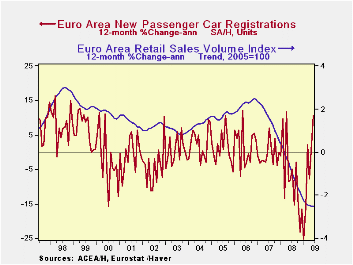 Global| Aug 05 2009
Global| Aug 05 2009EMU Retail and Auto Sales: the Good and the Ugly
Summary
Sales fall -Retail sales fell in the Zone in June. While the growth rat of sales is not decaying further, retail sales volumes have been dropping at a pace of -2.5% to -2.2% over the past twelve months. The year-over-year pace for [...]

Sales fall -Retail sales fell in the Zone
in June. While the growth rat of sales is not decaying further, retail
sales volumes have been dropping at a pace of -2.5% to -2.2% over the
past twelve months. The year-over-year pace for retail sales seems to
have finally stopped falling, based on the trend in the chart above.
The Good and Ugly of it all - Europe has
not suffered the same sort of spurt in the rate of unemployment that we
have in the US. But its level of unemployment remains high and it has
become even more elevated than it was. Consumer confidence has been hit
and consumers, even though better supported in Europe than in the US by
government programs, have cut back spending. Various programs in Europe
to spur auto sales have been successful as the auto registration data
show. So even as retail sales volumes shrink there is a bright spot in
the retail sector even if it is one aided by government actions. It is
always good to see that when given an incentive the consumer can and
does respond – that is not always the case.
Underlying trends are improving - The PMI
index from Markit on the service sector shows some improvement in the
service sector but not much. Services has improved to a reading of
44.82 in may then they slipped to 44.65 in June and in July they have
risen to 45.69. German showed a rather sharp rise in July along with
Italy while France has back-slipped in July along with Spain. The UK,
an EU member not an EMU member, has just posted its third reading in a
row above 50 for services and is the only large EU country showing
service sector expansion.
Trends that matter are more favorable -
Since most of the jobs are in services and since jobs determine
spending we can be encouraged about prospects for retail sales progress
from these developments. Retail sales remain the back bone of GDP
growth.
| Euro Area Retail Sales Volume | ||||||
|---|---|---|---|---|---|---|
| M/M | Saar | |||||
| Jun-09 | May-09 | Apr-09 | 3-Mo | 6-MO | 12-Mo | |
| Euro Area Total | -0.2% | -0.2% | -0.2% | -2.2% | -2.5% | -2.5% |
| Food, Beverages, Tobacco | -0.1% | -0.1% | -0.2% | -1.8% | -2.1% | -2.1% |
| Registrations: | ||||||
| Motor Vehicle Registration | 6.4% | 2.3% | 6.3% | 79.6% | 45.1% | 10.6% |
| Non-Food Country Detail: Volume | ||||||
| Germany | -1.8% | -1.3% | 1.4% | -6.9% | -5.5% | -1.9% |
| UK(EU) | 1.2% | -1.0% | 0.8% | 4.0% | 1.3% | 2.8% |
| The EA 13 countries are Austria, Belgium, Finland, France, Germany, Greece, Ireland, Italy, Luxembourg, the Netherlands, Portugal, Slovenia | ||||||
Robert Brusca
AuthorMore in Author Profile »Robert A. Brusca is Chief Economist of Fact and Opinion Economics, a consulting firm he founded in Manhattan. He has been an economist on Wall Street for over 25 years. He has visited central banking and large institutional clients in over 30 countries in his career as an economist. Mr. Brusca was a Divisional Research Chief at the Federal Reserve Bank of NY (Chief of the International Financial markets Division), a Fed Watcher at Irving Trust and Chief Economist at Nikko Securities International. He is widely quoted and appears in various media. Mr. Brusca holds an MA and Ph.D. in economics from Michigan State University and a BA in Economics from the University of Michigan. His research pursues his strong interests in non aligned policy economics as well as international economics. FAO Economics’ research targets investors to assist them in making better investment decisions in stocks, bonds and in a variety of international assets. The company does not manage money and has no conflicts in giving economic advice.
More Economy in Brief
 Global| Feb 05 2026
Global| Feb 05 2026Charts of the Week: Balanced Policy, Resilient Data and AI Narratives
by:Andrew Cates






